November eNews
Institutions: How Do They Matter?
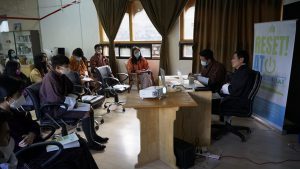
The second Reset! at The Media Lab on the theme ‘Institutions: How do they matter?’ highlighted the concept of “Institutions being the projections of societal beliefs” to help present a holistic understanding of the topic. The conversational exchange revolved around how collective values enshrined in norms, lay the foundation for both the formal and informal institutions in a society.
Dasho Sangay Khandu, a former member of parliament spoke on formal institutions as being more than infrastructures such as parliament, and the role of community in formalising social practices over time to strengthen the existing informal institutions. Dr Sonam Chuki, a curriculum developer in values education at the Royal Education Council, pointed out that informal institutions such as rituals, invoke community ownership and help the individual to participate actively in reinforcing these social practices as well.
The dialogue discussed in great length about the narrative of the institutions in Bhutan, the role of collective values and the significance of incorporating a balanced approach in tackling institutional challenges.
The voices within the space included educators, entrepreneurs, young professionals and students from the Political Science & Sociology Department, Royal Thimphu College.
Find below the links to the speaker’s opening remarks:
Dasho Sangay Khandu: https://bit.ly/3mlm9rv
Dr. Sonam Chuki: https://bit.ly/33IfQqX
Reset! at the Media Lab is supported by CISU.
Facts vs Misinformation in an Infodemic
With overwhelming information on COVID-19 and the rise of the ‘infodemic’, it has made it crucial now more than ever to be critical of what you see in the media. With the lack of media literacy, Bhutanese citizens, including individuals who are actively facilitating to keep people informed and aware, were unconsciously sharing information and pictures that were not verified, including fake news. In light of this, Bhutan Centre for Media and Democracy conducted the training on “Facts vs Misinformation in an Infodemic”, which was attended by 85 participants from different schools, colleges, and individuals who are in the frontline assisting the medical professional fight the pandemic like officials from the Ministry of Health (MoH), and volunteers from the Bhutan Red Cross Society, Bhutan Taxi Association, and De-Suung.
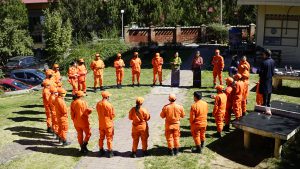
As volunteers helping the government contain the virus, the participants were made to think of how the training has changed the way they use media – both as a producer and as a consumer, to be cognizant of their own biases and predispositions, and the need to understand their target audiences.
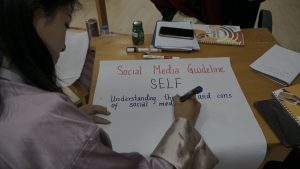
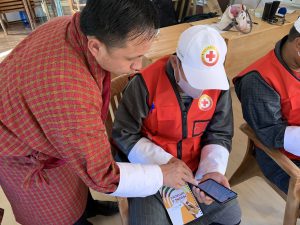
“Since the [start of the] pandemic, I was delegated to the National COVID-19 Media Team and that is when I had to work on creating content…Whatever the MoH was releasing on social media or any other platforms, we could have used the tools we were taught here today. I think it would have helped us disseminate ideas more professionally…this is a very helpful platform for us to learn and for inner growth and to create quality content for Bhutanese citizens.” Kinley Wangchuk, Ministry of Health.
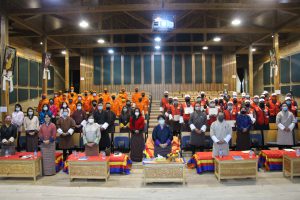
The closing was graced by the Honourable Health Minister Lyonpo Dechen Wangmo. Lyonpo highlighted the importance of the training and mentioned the struggles MoH faced at the start of the pandemic dealing with disseminating information but mainly with the spread of fake news and misinformation, which not only created panic in the public but also cost the government in terms of time, money and resources.
This training was supported by Give2Asia.
Youth Initiative 2020 Closing
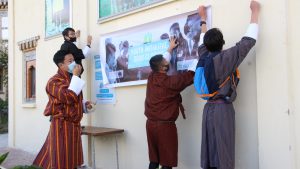
“Quite often, when we ask ourselves this important question of how our future will be, there are some who believe that the road ahead will be bright; others are doubtful of the future as they look around and are unsure of what their lives have amounted to… However, listening to the presentations today, I personally find the road ahead to be optimistic and significant” (Lyonpo Wangchuk Namgyel, Speaker of the National Assembly)
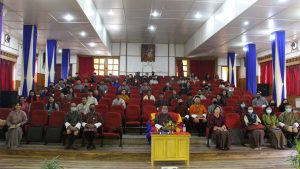
Continuing to strive towards sustained youth engagement in policy dialogue and deliberation, the members of the YI 2020 cohort, who also carried out NYP revision and were trained on online social media campaign, presented their learnings and challenges from carrying out their respective pilot Social Media Advocacy Campaigns on the four issues: Mental health, Exercising responsibility and not just rights, Dignity of labour, and Formal education system. The YI members received feedback from those in the audience to think about ways to reach youth who are not on social media and to think about the sustainability of their pilot campaigns.
Within a month of campaign launches, the members were collectively able to receive a total of 3,000 ‘likes’ on their pages and an estimated 85,000 total ‘views’ on their video content posted. The learnings and skills from running virtual social media campaigns will prepare them to become advocates for the NYP when it eventually gets passed.
Those in attendance included Members of Parliament from the Good Governance and Women, Children and Youth committees, National Commission for Women and Children, educators, media houses, YI alumnus and youths from various schools and walks of life.
Youth Initiative 2020 was supported by CISU.
Conversation Series 4 – Social Protection
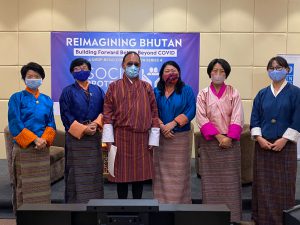
The fourth UNDP-BCMD Conversation Series on ‘Social Protection’ generated a discussion on building a social protection system that is not only inclusive but is sustainable and shock-responsive.
From what the speakers presented at the forum, it was apparent that aside from His Majesty’s Kidu for the needy, the current pension system covers only those in the public sector. There is not only a need felt for an inclusive system that spans across lifecycle but the need to broaden the concept of social protection from that of charity to a “social contract”. While support services are made available for vulnerable groups like victims of domestic violence and people with disabilities, the speakers pointed out the need for better coordination across agencies and to bridge the gap between policies and implementation.
The Director of Development Pathways, Stephen Kidd stated that social protection is the core component of an effective economic growth strategy. He spoke about the government and its citizens building a social contract, where the citizens contribute to the nation through taxes and the government gives back these taxes through redistribution, social protection etc. This not only reduces inequalities but also builds cohesive and inclusive societies where people are willing to pay higher taxes in return for high-quality services. He also spoke about the lifecycle approach where everyone from childhood to old age has access to social security and are protected throughout their lifecycle. This model was recognised as the way forward for all countries in the Universal Declaration of Human Rights, 1948.
Support us this #GivingTuesday

By empowering youth with the knowledge, skills and aptitude necessary to inquire into socio-political and economic issues and engage in policy discussions, we can create a culture of participatory democracy in Bhutan. This goal is achieved through a year-long membership in the Youth Initiative (YI) programme that equips the youth with policy review, deliberation and advocacy skills.
This year, BCMD was able to debunk the above misconception through a youth-centric and inclusive review of the 2011 National Youth Policy. The members were taken on a reflective journey inquiring into their current context, identifying underlying causes of the issues and soliciting their views to address the identified issues. The members were then equipped with policy review and advocacy skills to engage in policy dialogue and to influence decisions through advocacy and voice.
We hope to replicate this model of youth engagement with the aim of nurturing youths as active and engaged citizens with a discerning mind and an ability to contribute meaningfully to society. More importantly, addressing the socio-cultural attitude towards youth participation, the project aims to demonstrate how youths’ experiences and perspectives can be capitalised on to realise the shared goal of improved policy relevance and currency.
This #GivingTuesday (1 December) please donate to help us sustain youth engagement and demonstrate meaningful youth participation.
